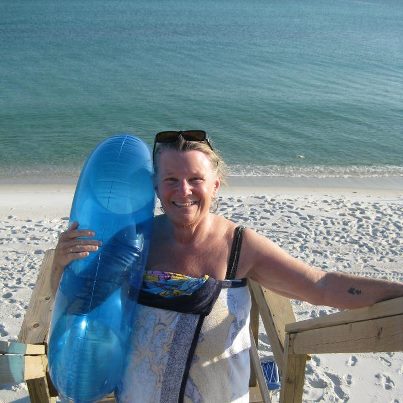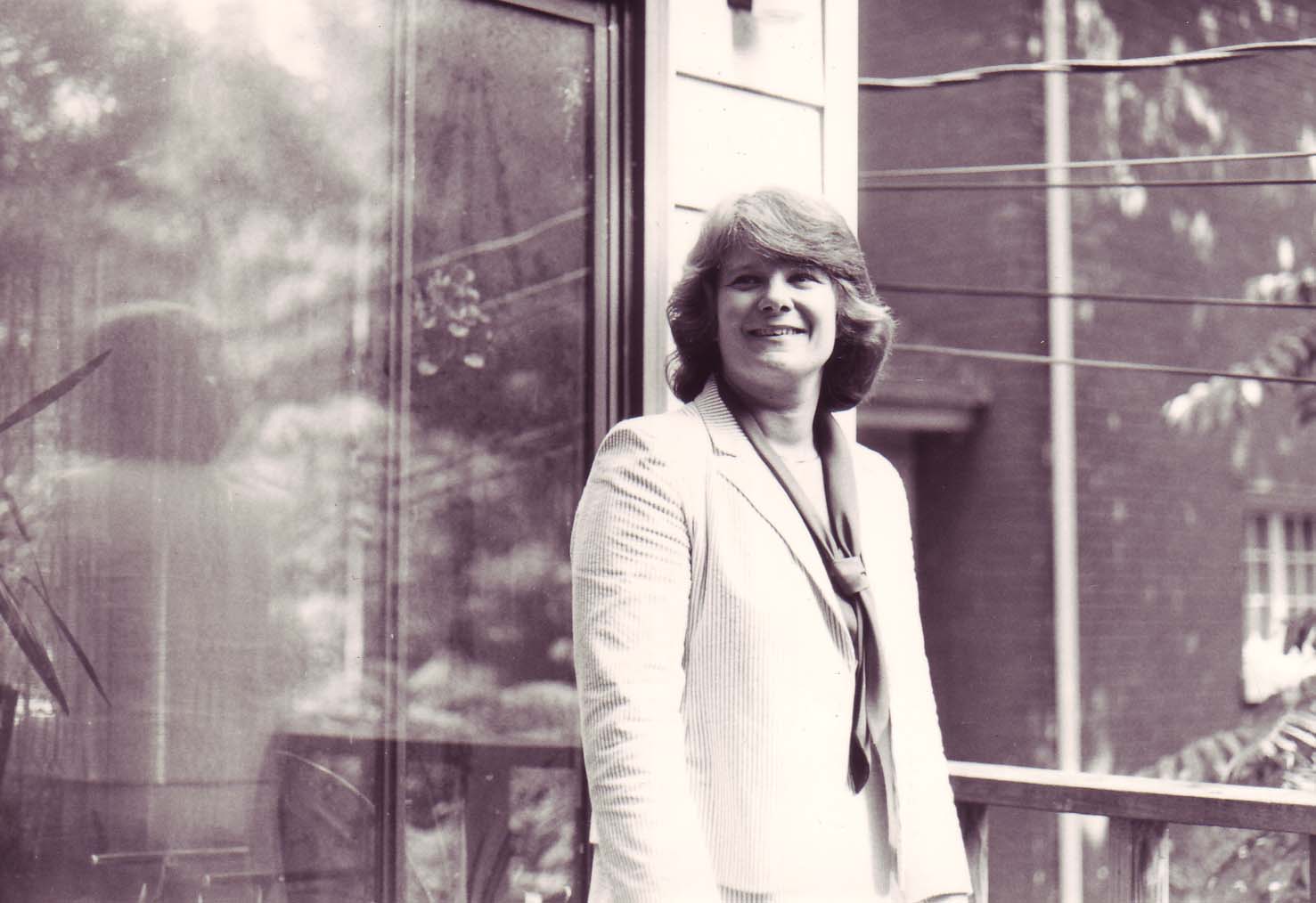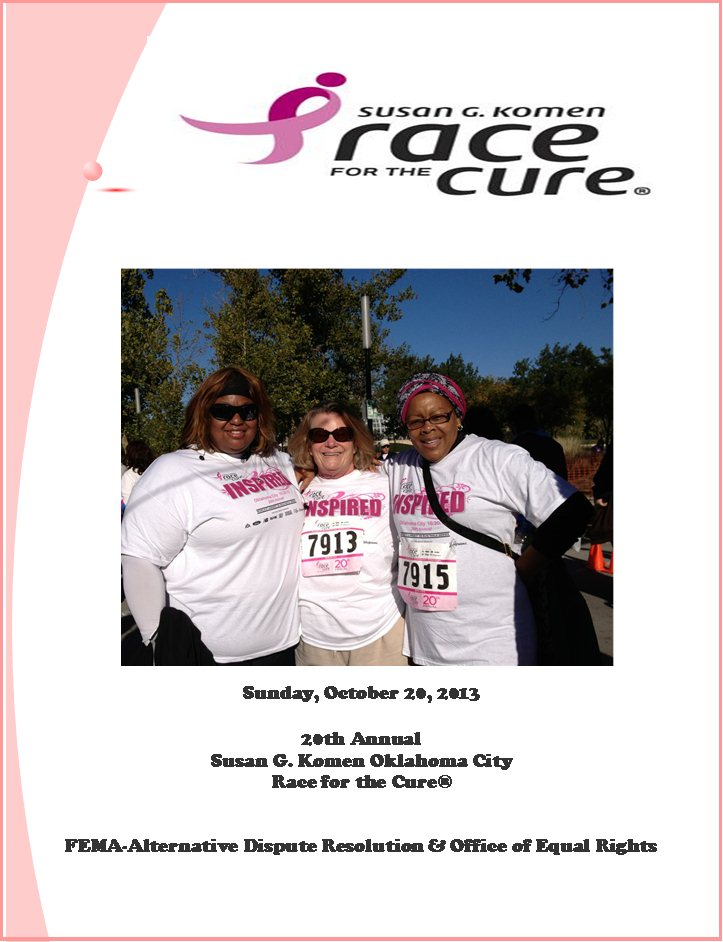Powell, Carole de Bra

Rose Norman interviewed Carole de Bra Powell at Reynolds House in Santa Rosa, FL, December 31, 2012.
Biographical Information
Carole de Bra Powell (born 1946) was raised in Pensacola, Florida, and attended the University of Florida before moving to Nashville, Tennessee, in 1970. There she worked in advertising while doing various kinds of activism, including starting Womankind Books in 1977. Presently she is a FEMA mediator. Her FEMA work requires constant travel to U.S. disaster sites with particular focus in Los Angeles and Texas.
Carole lives in Frederick, Maryland, with her newly married partner of 17 years, Nancy Smouse.
Early Activism
From 1965 to 1969, Carole attended the University of Florida, majoring in English and minoring in Psychology. She was raising two children and working for the school paper, The Alligator. Carole became involved with civil rights activism, influenced by the mentorship of two faculty wives. At the time, she was a member of the Gainesville Women for Equal Rights [founded in 1964 by Beverly Jones]. At some point here, Wayne eventually left Carole, and as a result, she was denied married student housing, having been told she was “undesirable” because her husband was absent. This was a moment contributing to her feminist consciousness.
When Carole moved to Nashville with her children, she became involved with Democratic politics and Edgehill United Methodist church, a hotbed of activism.
Between 1970 and 1975, Carole focused on the discussion and study of Mary Daly’s books on God, spirituality, and language. She served on the national Methodist Commission on the Status and Role of Women, working at an advertising agency to help pay the bills.
During this time, Carole was only peripherally involved with the Women’s Center. The following year, Carole's eight-year-old son, Gregory, was electrocuted. He lived for a year after the accident, but passed away in June 1976.
Gregory’s death left Carole with a settlement, which she used to pay the medical expenses. In 1977, Carole had sufficient funds remaining to invest in a feminist bookstore on Belmont Avenue, Womankind Books. Carole stated at one time: “I've probably had 200 people tell me how important that bookstore was to them.” She closed the store in 1984 when she moved to Chicago.
On being a lesbian
Carole first developed lesbian feelings in 8th grade. She had a crush on her Girl Scout camp counselor to whom she wrote long letters for years, occasionally getting a postcard reply. Then, in 11th grade, the counselor, TJ, began to send her long letters. The camp counselor was 10 years older than Carole and about to start graduate school at the University of Missouri. A week before Carole went out to see her in Missouri, TJ, found a girlfriend, and broke off their relationship. Carole, heartbroken, went home to Pensacola, back to her boyfriend Wayne. Right before going off for Girl Scout camp counselor training in August, she slept with Wayne. In September, she realized she was pregnant. Since it is 1963, abortion was inconceivable. Carole then married Wayne in October, a few months before graduating high school. She continued to think of herself as heterosexual until she met a great deal of lesbians in Nashville in the 1970's. Her exposure to other lesbians culminated in her first relationship in 1976 with a woman named Joanna. This relationship would last twenty years.
When asked about how she identified, Carole commented that: “Being a lesbian wasn't as significant to me as [being] a feminis[t] since I didn't see myself as a lesbian until I was in my 30's. Being a feminist and an activist-organizer, as well as a mother, was much more significant in defining who I was.” Carole expressed that even after she identified as a lesbian, she found it difficult to relate with more “radical lesbians”. She explained that “this group of radical lesbians” lived a separate life from her own as a mother with two boys. “Everybody was going around and talking about their ideas for the group. When it got to me, I made a joke, saying I wasn't a lesbian, I just slept with one. Didn't go over well, not PC. Women of color, lower income women, women in prison—for them it was much less an intellectual discussion than it was for us.”
Carole explained that she saw herself as on the line between privileged and underprivileged. She always struggled with child support issues as a single parent and couldn't get married student housing at UF after Wayne left.
Carole had been interested in Cheryl Bezis, who was unavailable. She attended a meeting Cheryl held on women interested in owning a business, due solely to her attraction. It was at this meeting that she met Joanna Morrison, who was out. Carole herself had never been with a woman. “She was so good looking, and she walked me out to my car afterwards, “said Carole of Morrison. A few days later, Carole went down to Gwen Billig’s photo lab, and who came out of the darkroom but Joanna, who invited her to lunch. She ended up heading down, by herself, to The Other Side, a lesbian bar. Powell danced with Ariel Colburn, during which Joanna cut in, and the rest is history.
On Nashville women
Nashville was a little town then, but the music industry had some really strong female energy. The Bluebird was a woman-owned business, a place where lots of musicians played in order to get heard by people who could record them. Amy Kurland owned the business until 1982, when she sold it to the Nashville Songwriters Association International on January 1, 2008. That generation of women, Amy’s generation, was exceptional in Nashville.
On Church Women United
“Before I was a lesbian, I did a program about women in the church that I presented at various churches. We had a woman who never married, a divorced woman, a widow, and (when we could) a lesbian - all who formed a panel talking to churches about how you wind up single in a culture that gives women value, because of who they’re married to. That’s how I got connected to the lesbians at Edgehill.”
“At that time, I also did some work with nursing homes with Victoria Webb.” Carole worked for voter registration and Democratic Women, headed by Carleen Waller. Carleen was a force in this women’s group, which was very liberal, especially compared to the rest of the state.
On Gregory’s accident
Before 1975, Carole had met Chris Modisher and Della Hughes while in Divinity School and attending Edgehill Methodist. Representing Edgehill Methodist, she attended an annual, mandatory conference, taking the boys with her. One evening, she was at a meeting where a woman from New York spoke about women’s issues. A friend kept the boys, and spent the night at Carole's house. While Carole was at the meeting, she asked herself which of her children she would lose if she had to lose one, and couldn't decide. She thought about going home to check on the boys, but never ended up doing it. Gregory was electrocuted early the next morning. He lived for a year, but never regained consciousness. Inspired by nights spent at the hospital where chaplains spouted platitudes, Carole decided to attend divinity school to do the job better, though she did not end up graduating.
Womankind Books
Carole ended up meeting Dorrie Woodson, a woman who sold feminist books at conferences, and the two began talking about what Carole could do to support women. Woodson offered to sell half of her books to open a store, and the two became partners. Carole invested insurance money from Gregory’s death into the store, about $50K. By 1977, differences in opinions about the business resulted in Carole buying out Woodson's share within the first six months.
The bookstore became of place of convergence for many different groups. Vanderbilt health care group met at the store, May Sarton spoke there, and Take Back the Night marches were organized in that space. The bookstore was a magnet for rural, underprivileged women who needed support. Carole made sure that the store was inclusive for women of all races, educational backgrounds, classes, and incomes.
Carole began to lead book groups at prisons housing male sexual offenders, as well as female prisons for non-violent crimes.
Womankind Support Project
The bookstore was a place in which women could access resources and organizations. Responses were found for requests referring women to doctors, lawyers, therapists, and artists. The bookstore’s mailing list increased to 1000 women in Tennessee. Out of this came a support project giving rise to a coffeehouse, women’s shelter, a women’s health center, softball team, art show, and a variety of supportive sub-groups (a peer evaluation group for therapists).
About 150 people participated in the large Womankind Support Project meetings held at Carole and Joanna’s house.
For the shelter, someone came to Carole from the YWCA and one of her church groups saying they had money for a women’s emergency shelter, but that they needed a group willing to start the initiative. Carole then proceeded to speak with Susan Schewel and Betsy Brock, and they devised a way to raise money: a system of ticket selling. Ten people organized a cocktail party fundraiser in Tennessee. The party raised $15,000 in total. Of that $15,000, $5000 was used to develop the women’s health center that Carole briefly directed; $8000 went to YWCA, which then got matching funds for the shelter; and the other $2000 was used to cover the expenses of the event.
Carole’s bookstore was located approximately one block from a large Baptist church. One night, during a revival, a man entered the store to ask Ellen and Elise where he could find a prostitute. Carole walked back to the church with him and told the preacher about it. “The reality of that energy was pretty phenomenal for us in Nashville. We acted on our needs and were supportive of one another.” That being said, Carole claimed that they “did all the bad things, too,” offering the example of the bookstore being sued by a therapist, once involved in the Womankind Support Project, who thought Carole owed her wages.
The bookstore was also used as a location for hosting concerts with lesbian musicians. Merril, a person living in the country, spoke about how the bookstore brought in lesbian musicians for occasional concerts. These concerts resulted in Womankind Books being a record distributor.
The first national conference of women’s label distributors was in Nashville, organized by Womankind Books. “That was a pretty phenomenal concept...All of these women had a nationwide organization for concerts and record distribution. It’s also phenomenal that this was in the 70's in Nashville, in the Bible Belt.”



"Empowerment comes from ideas."
― Charlene Carruthers
"Your silence will not protect you."
— Tourmaline
"Gender is the poetry each of us makes out of the language we are taught."
— Leila Raven


